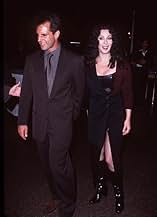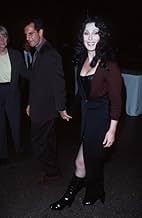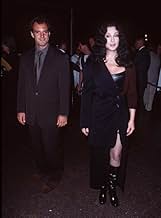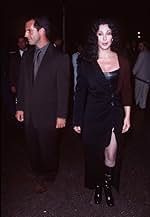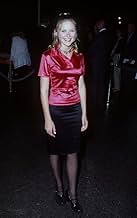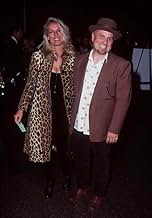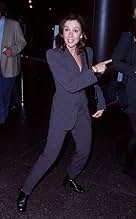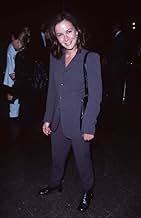IMDb-BEWERTUNG
6,9/10
5390
IHRE BEWERTUNG
Füge eine Handlung in deiner Sprache hinzuThe movie examines the abortion issue through three stories set in different eras: 1952, 1974 and 1996.The movie examines the abortion issue through three stories set in different eras: 1952, 1974 and 1996.The movie examines the abortion issue through three stories set in different eras: 1952, 1974 and 1996.
- Für 4 Primetime Emmys nominiert
- 4 Gewinne & 15 Nominierungen insgesamt
Bob Shuttleworth
- Hospital Visitor (segment "1952")
- (as Bob Shuttlesworth)
Empfohlene Bewertungen
Lest we forget.
For all the folks who have no clue as to what a woman who finds herself pregnant goes through, this movie could be a great educational tool. Making a baby is easy and one doesn't need any degree of maturity to accomplish the task. Deciding to continue with a pregnancy or to termitate is a trying, sometimes heartrending decision - one that is very individual and very personal. Sometimes there are no right answers, only better choices.
There are now 2 generations of women (and men) who have no idea what life was like before women had access to reliable birth control and safe abortion. Because of birth control, fewer women are forced to make these life or death decisions. Because of legalized and safe abortion, fewer women are forced to go to less than qualified, back alley abortionists who more often than not rendered their clients barren. This movie showed the worst and the best. Bravo for having the guts to make this.
For all the folks who have no clue as to what a woman who finds herself pregnant goes through, this movie could be a great educational tool. Making a baby is easy and one doesn't need any degree of maturity to accomplish the task. Deciding to continue with a pregnancy or to termitate is a trying, sometimes heartrending decision - one that is very individual and very personal. Sometimes there are no right answers, only better choices.
There are now 2 generations of women (and men) who have no idea what life was like before women had access to reliable birth control and safe abortion. Because of birth control, fewer women are forced to make these life or death decisions. Because of legalized and safe abortion, fewer women are forced to go to less than qualified, back alley abortionists who more often than not rendered their clients barren. This movie showed the worst and the best. Bravo for having the guts to make this.
I love this film because it tackles the issue from both internal and external places. Arguments are presented without bias, no matter what some may say. My dad even thought this was a Pro-Life film. I clearly disagree with him and believe it's got lots of Pro-Choice leanings. Demi Moore playing a nurse who is totally alone with an unplanned pregnancy was excellent. Her fear and aloneness in the not so fabulous '50s was so beautifully represented. And it's like the other comment said, her "family" treated her more like an extension of their dead son than like an individual person. I'd rather have no family at all than one like that. Sissy Spacek represented a choice, in a decade where choices were allowed. She had it so much easier than Demi Moore's character, yet her struggle and ultimate decision were just as hard in a lot of ways, maybe even harder. Anne Heche and Cher play two women who are up against Pro-Lifers who "love babies". It reminds me of a bumper sticker I once saw: "I love babies...born and unborn." Okay, great, but too many people who love babies actually hate KIDS. Once the child is no longer bald, pink and small, this passionate "love" turns into hatred and abuse of the worst kind. I know, I've seen it and I've lived it. Truly the most nerve jangling moment is at the very end of the film. Matthew Lillard is terrific as a psycho!!!
I give this film an A+++++
I give this film an A+++++
Demi Moore, Sissy Spacek and Anne Heche play three very different women from different eras (the 1950's, 1970's and 1990's respectively) who are each confronted with the same dilemma. They're pregnant, and struggling with whether or not to end the pregnancy, with each story being set against the value system of the day. The stories are unrelated in any other way, but together they represent an interesting evolution of thoughts around the abortion issue.
Moore's performance is probably the one that brings forth the greatest feelings of sympathy from the viewer. She's a nurse and a young widow, alone and lonely except for the connection to her deceased husband's family, who has to find a way to deal with a pregnancy that was unplanned and the result of a one-time "fling" with her brother in law. Abortion is illegal, she has to avoid shaming her "family," and she can't just disappear for nine months to give birth because she has a job and little money. In the end she finds a shady abortion provider who does the deed on her kitchen table, and leaves her in a desperate condition - her fate remaining a mystery. This was the most powerful of the stories. Heche's character has an affair with an older, married man who wants nothing to do with the responsibility. She chooses abortion after a lot of soul-searching, but while it's legal in the 90's she's confronted by pro-life protesters at the door of the clinic who do cause her to think twice about the decision, although she ultimately goes ahead with it. With a best friend who's pro-life but supportive of her she goes falls into a scene of horror that seemed to me too expected and contrived. The soul-searching the character goes through, though, makes this a worthwhile vignette. The weakest of the three stories was probably that featuring Spacek. She's a mother of three in a happy marriage and re-starting her own education when she becomes pregnant again. This story revolves mostly around tensions within the family as all consider the potential impact of the pregnancy on their hopes and dreams. In the end, this pregnancy continues.
It was interesting to see the perspective on the issue from three very different generations.
Moore's performance is probably the one that brings forth the greatest feelings of sympathy from the viewer. She's a nurse and a young widow, alone and lonely except for the connection to her deceased husband's family, who has to find a way to deal with a pregnancy that was unplanned and the result of a one-time "fling" with her brother in law. Abortion is illegal, she has to avoid shaming her "family," and she can't just disappear for nine months to give birth because she has a job and little money. In the end she finds a shady abortion provider who does the deed on her kitchen table, and leaves her in a desperate condition - her fate remaining a mystery. This was the most powerful of the stories. Heche's character has an affair with an older, married man who wants nothing to do with the responsibility. She chooses abortion after a lot of soul-searching, but while it's legal in the 90's she's confronted by pro-life protesters at the door of the clinic who do cause her to think twice about the decision, although she ultimately goes ahead with it. With a best friend who's pro-life but supportive of her she goes falls into a scene of horror that seemed to me too expected and contrived. The soul-searching the character goes through, though, makes this a worthwhile vignette. The weakest of the three stories was probably that featuring Spacek. She's a mother of three in a happy marriage and re-starting her own education when she becomes pregnant again. This story revolves mostly around tensions within the family as all consider the potential impact of the pregnancy on their hopes and dreams. In the end, this pregnancy continues.
It was interesting to see the perspective on the issue from three very different generations.
Excellent film. Shows the realities of abortion and the trials and tribulations of the women who had to endure these situations. True to life and accurate depiction. Hopefully will help others to understand why some women choose to abort. It is not a decision made lightly or without conscious. And the film depicts how important it is for abortion to be legal. How even when it is illegal it still happens.
Very educational. A definite must see. Especially for those unsure of how they feel on this issue.
Excellent casting. Very emotional plots.
Very educational. A definite must see. Especially for those unsure of how they feel on this issue.
Excellent casting. Very emotional plots.
I have just seen 'If These Walls Could Talk' for the first time, and I am completely in awe. This film should be mandatory viewing material for any person who thinks that abortion is an easy choice or that women faced with an unplanned pregnancy should have their right to choose taken away from them.
Sissy Spacek did a wonderful job portraying the most overlooked unplanned pregnancy demographic: the aging career mother who must choose whether or not to make the sacrifice of raising another child. In this story I truly appreciated the message that choosing to have a child is also pro-choice. Anne Heche's role in the final story was the most 'typical' of the three: the single college student who must struggle with her own moral and personal issues when making a choice about her pregnancy. While she portrayed the most common demographic of women who face an unplanned pregnancy, her role was beautifully and honestly acted. But the most riveting and heartbreaking of the three stories featured Demi Moore as a young widow who must make the hardest decision in her life-- to risk not only her career and reputation but the relationship of her in-laws who have taken her in as one of their own by carrying to term the baby of her dead husband's brother, or to risk her life by choosing what was once a barbaric and incredibly dangerous procedure due to the illegality of abortion. Her struggle is disturbing, and any woman who remembers the dark days before Roe v. Wade will feel her character's pain, fear, and especially her desperation. This story in particular showcases why keeping abortion safe and legal is so very necessary.
What struck me most about this film was not only the realism in all three situations, but how each one of the stories showed that "Pro-Choice" is not always "Pro-Abortion"; a fact that those of us who support a woman's right to chose will be all too glad to point out while those of the stauncher anti-choice fold may be a little slow to admit. The struggle that each woman faces in this film is unique, and while another reviewer mistakenly commented that each instance was merely 'cliché', I will argue that each instance was REAL. Rape and incest are not the causes for most unplanned pregnancies, and a great number of women who choose abortion are of legal age to do so. This film would have been 'cliché' if every actor had portrayed a low-income person of color, which is clearly unrealistic. And while violence against abortion providers isn't an every day occurrence, there are people in our society who wish that were the case-- and including this scene in the film shows us, in graphic detail, the hypocrisy of that opinion.
I was surprised that this film, especially the final story, didn't tackle other reproductive choice-related issues such as birth control. However, I was extremely pleased with how the final story educated viewers on the realities of the abortion procedure (mandatory counseling and all)-- a reality which couldn't be further from the horrific depictions offered up by many in the anti-choice camp. Speaking of which: I was grateful for this film showing that not all people who oppose abortion are stereotypical, out of control lunatics, but that the most radical in this faction tend to be, ironically, male. And one comment made by a character regarding adoption truly hit home for me as I once worked in a residential facility for abandoned and abused children that was, like so many others in this country, bursting at the seams: "The last time I checked, there wasn't a shortage of little black babies".
This film needs to be aired during prime time and piped into the Bush White House, if for no other reason than to show that abortion is not a black and white issue, that the argument surrounding it cannot be settled through protest, violence or prohibition, and that restricting a woman's legal right to reproductive choice will only complicate matters further but will not be an end to abortion. Anyone who has ever been faced with an unplanned pregnancy will agree, and anyone who hasn't will learn that their opinion can be subject to change depending on their circumstances.
Sissy Spacek did a wonderful job portraying the most overlooked unplanned pregnancy demographic: the aging career mother who must choose whether or not to make the sacrifice of raising another child. In this story I truly appreciated the message that choosing to have a child is also pro-choice. Anne Heche's role in the final story was the most 'typical' of the three: the single college student who must struggle with her own moral and personal issues when making a choice about her pregnancy. While she portrayed the most common demographic of women who face an unplanned pregnancy, her role was beautifully and honestly acted. But the most riveting and heartbreaking of the three stories featured Demi Moore as a young widow who must make the hardest decision in her life-- to risk not only her career and reputation but the relationship of her in-laws who have taken her in as one of their own by carrying to term the baby of her dead husband's brother, or to risk her life by choosing what was once a barbaric and incredibly dangerous procedure due to the illegality of abortion. Her struggle is disturbing, and any woman who remembers the dark days before Roe v. Wade will feel her character's pain, fear, and especially her desperation. This story in particular showcases why keeping abortion safe and legal is so very necessary.
What struck me most about this film was not only the realism in all three situations, but how each one of the stories showed that "Pro-Choice" is not always "Pro-Abortion"; a fact that those of us who support a woman's right to chose will be all too glad to point out while those of the stauncher anti-choice fold may be a little slow to admit. The struggle that each woman faces in this film is unique, and while another reviewer mistakenly commented that each instance was merely 'cliché', I will argue that each instance was REAL. Rape and incest are not the causes for most unplanned pregnancies, and a great number of women who choose abortion are of legal age to do so. This film would have been 'cliché' if every actor had portrayed a low-income person of color, which is clearly unrealistic. And while violence against abortion providers isn't an every day occurrence, there are people in our society who wish that were the case-- and including this scene in the film shows us, in graphic detail, the hypocrisy of that opinion.
I was surprised that this film, especially the final story, didn't tackle other reproductive choice-related issues such as birth control. However, I was extremely pleased with how the final story educated viewers on the realities of the abortion procedure (mandatory counseling and all)-- a reality which couldn't be further from the horrific depictions offered up by many in the anti-choice camp. Speaking of which: I was grateful for this film showing that not all people who oppose abortion are stereotypical, out of control lunatics, but that the most radical in this faction tend to be, ironically, male. And one comment made by a character regarding adoption truly hit home for me as I once worked in a residential facility for abandoned and abused children that was, like so many others in this country, bursting at the seams: "The last time I checked, there wasn't a shortage of little black babies".
This film needs to be aired during prime time and piped into the Bush White House, if for no other reason than to show that abortion is not a black and white issue, that the argument surrounding it cannot be settled through protest, violence or prohibition, and that restricting a woman's legal right to reproductive choice will only complicate matters further but will not be an end to abortion. Anyone who has ever been faced with an unplanned pregnancy will agree, and anyone who hasn't will learn that their opinion can be subject to change depending on their circumstances.
Wusstest du schon
- WissenswertesHolds the record as HBO's highest-rated original movie.
- PatzerIn the 1974 segment, one of the kids mentions wanting to watch The Partridge Family (1970), which at that time, aired on Saturday night. However, the kids had been to school that day so it was not a Saturday.
- Zitate
Patti (segment "1996"): You get this abortion and I swear to you, you are on your own.
- Alternative VersionenThe UK video version was cut by 3 secs to reduce multiple gunshots during the hospital shooting scene.
- SoundtracksCrazy
Written and Performed by Seal
Top-Auswahl
Melde dich zum Bewerten an und greife auf die Watchlist für personalisierte Empfehlungen zu.
Details
- Laufzeit1 Stunde 37 Minuten
- Farbe
- Sound-Mix
- Seitenverhältnis
- 1.33 : 1
Zu dieser Seite beitragen
Bearbeitung vorschlagen oder fehlenden Inhalt hinzufügen

Oberste Lücke
By what name was Haus der stummen Schreie (1996) officially released in Canada in English?
Antwort
